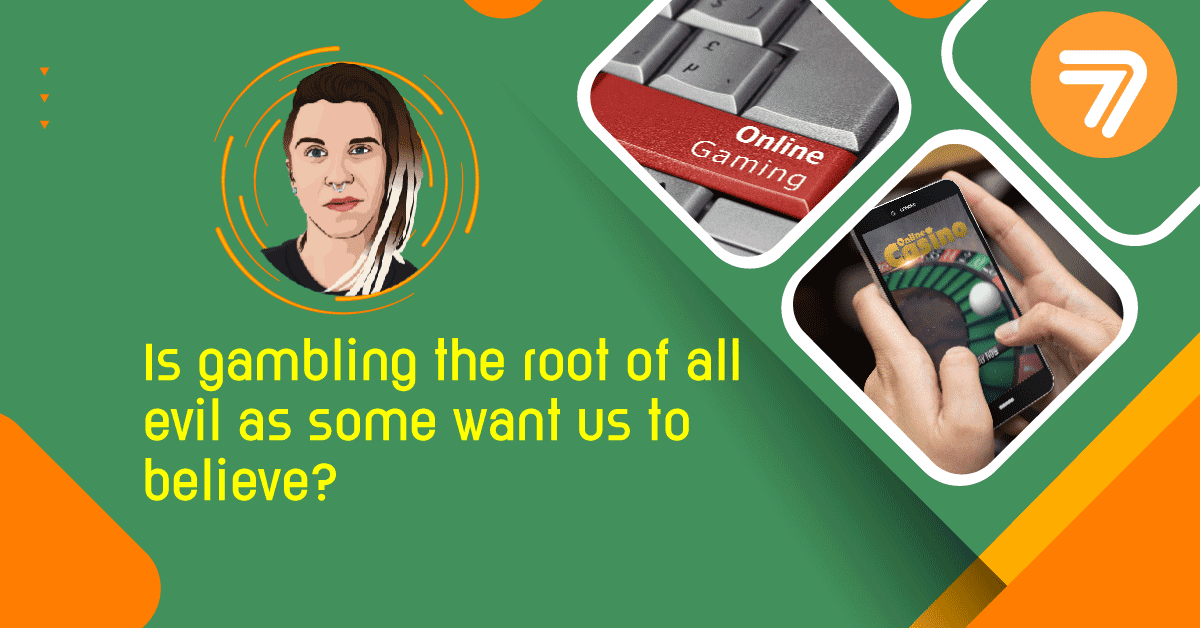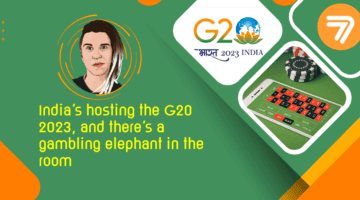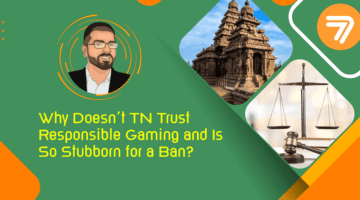Is gambling the root of all evil as some want us to believe?

The views and opinions expressed here are those of the authors and do not necessarily reflect those of SevenJackpots or its clients.
Gambling has a notoriously bad reputation
Although gambling and various forms of betting have existed for thousands of years, it’s an activity that still has a bad reputation.
Now and then, we can find articles of people gambling their life savings away. Or articles mentioning people committing suicide after destroying their lives through gambling. Although these situations are absolutely horrible and clear examples of severe gambling addiction, they aren’t the norm.
As a matter of fact, millions of people play real money games every day. Without ever having issues with it.
Often when I come across someone who is “against” gambling, it doesn’t take long to notice that their strong dislike is rooted in a lack of knowledge and understanding of gambling.
So I’m going to take on some common misconceptions about real money gambling. And try to explain why gambling isn’t the root of all evil as some want us to believe.
Casino games are purposely unfair
One common misconception is that casinos make secret tweaks to their games so that players will lose more money than expected.
While that might be true for shady gambling dens run by criminals, or the old casinos of the Wild West, it couldn’t be further from the truth at legitimate casinos of today.
Whether land-based or online, casinos need a gambling license to operate legally. The license requires casinos to regularly check their games to prove that they are fair. And the casino can’t check their own games.
Instead, the checks are done by independent auditors like eCOGRA or iTechLabs. This ensures that neither the casino nor the provider of the games can tweak the game in their favor.
Gambling is addictive
I’m not saying that gambling isn’t addictive. However, one common misconception is that gambling will reel you in as easily as heroin would. One try, one spin, and you’re well on your way to gambling your life away.
This is simply not true for most people. But it could very well be true for people with addictive tendencies. Research shows that gambling problems are more prevalent in societal groups that consume higher volumes of alcohol and drugs than others. In other words, gambling can become problematic when it’s done irresponsibly.
Just as you shouldn’t drink and drive, you shouldn’t drink and gamble. This is actually something that genuine online casinos will state. These online casinos also have processes in place for spotting problem gambling.
Casinos trick you into playing with money you can’t afford to lose
While fraudulent, unlicensed casinos can use aggressive marketing to “trick” players into gambling more. Licensed casinos won’t do that.
Legitimate casinos are required to offer their players responsible gambling tools. They also have to follow strict marketing guidelines ensuring that any marketing message is clear and truthful.
This is especially true in regulated markets. There, the government has a larger influence on what casino operators can and cannot legally do.
You can only win if you bet large amounts
This misconception goes hand in hand with the belief that a casino wants to cheat you, and not understanding how casino games work.
Most games you’ll find at a casino are based on chance. This means that the likelihood of you landing a win is equally big every time. Any rounds played before that game won’t be able to affect the outcome.
This is true no matter the amount of money you bet. No legitimate licensed casino will do you any favors for placing larger bets.
That said, there are a small number of slots that will, for example, only qualify you for the chance of triggering a jackpot by placing larger bets. However, this is clearly stated within the game as an additional, optional feature.
The money you lose will be used for criminal activity
All of the gambling licenses you see casinos use here at SevenJackpots have rules on anti-money laundering.
This includes keeping company and player funds separate from each other, having transactional logs available for auditors, and processes for conducting financial checks on players, so-called SOI, or SOW, Source of Income, or Source of Wealth.
Players who meet the criteria for such checks will be asked to provide supporting evidence of the origin of their funds used at the casino. This way, the casino can confirm that the funds are coming from legitimate sources.
Gambling is unfairly treated
Suppose we were to place gambling in the context of other “dangerous” activities such as smoking, drinking, and consuming sugar. In that case, it becomes clear that the gambling industry is already more restricted than most.
No checks are being done at the store on a person buying a large amount of alcohol, cigarettes, or sweets several times a week. There are no requirements for the shop owner to find out if the person can afford the purchase, or if they are having a problematic relationship with what they are buying.
Even if you wanted to set limits on how much you’re allowing yourself to spend on these products or for how long during the day you are allowed to consume them, there are no such tools.
Regulation is the number one way to create responsible gambling habits
Establishing a proper gambling regulation in India would allow the government to have more control over how land-based and online casinos market themselves to the population.
It would also result in profits from taxation that could be used as resources to clamp down on illegal gambling.
And by utilizing the Aadhaar card, it would minimize the exposure of gambling to minors.
So, is gambling evil? I certainly don’t think so. I think that, with proper knowledge and respect of the game and the games being available through regulated means, gambling can responsibly exist in Indian society.






